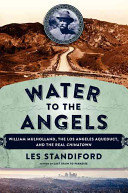2018 School Spending Survey Report
Water to the Angels: William Mulholland, His Monumental Aqueduct, and the Rise of Los Angeles
Ecco: HarperCollins. Mar. 2015. 336p. maps. notes. bibliog. index. ISBN 9780062251428. $28.99; ebk. ISBN 9780062251442. BIOG
COPY ISBN
VERDICT This work might appeal to those interested in the American West, California, water rights, and biography. However, readers wanting a more balanced perspective should consider Mark Reisner's Cadillac Desert. [See Prepub Alert, 9/14/14.]
RELATED
ALREADY A SUBSCRIBER? LOG IN
We are currently offering this content for free. Sign up now to activate your personal profile, where you can save articles for future viewing




Comment Policy:
Comment should not be empty !!!